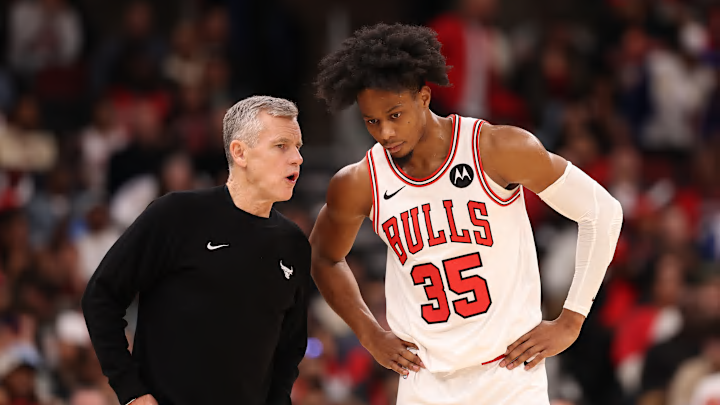Sans the 2023–24 season, Isaac Okoro’s minutes and points per game have declined every year since his rookie campaign. The former fifth-overall pick has gone from a promising rookie to a middling rotation player in just half a decade. From the outside looking in, how did that happen?
Onlookers—myself included—wondered how a player who averaged 9.6 points per game as a rookie, while steadily improving his true shooting efficiency, couldn’t find more time on the floor. Especially when he remained one of the team’s most reliable defenders.
Isaac Okoro's tenure with Cleveland was full of ups and downs
It often felt as though the team that drafted Okoro, the Cleveland Cavaliers, did everything possible to move him into a reserve role. During the Cavaliers’ breakout 2022–23 season, when they won 51 games, Okoro started just 46 of 76 appearances as Dean Wade and Lamar Stevens gradually ate into his minutes.
Nonetheless, neither Wade nor Stevens seemed to be a clearly better option, at least on paper. Of the three, Wade posted the best on/off numbers, but despite his reputation as a capable shooter, he actually connected on threes at a lower rate than Okoro. Stevens, meanwhile, provided solid minutes during his time in Cleveland but now suits up in the EuroLeague, which, fairly or not, says plenty about his long-term NBA prospects.
Okoro’s disappointing 2022–23 campaign was followed by a career-best 2023–24 season, in which he averaged a personal high of 9.6 points per game and shot 39.1 percent from three. Yet even as he improved, his role remained limited—he started just 42 games, fewer than the year before and only slightly more than Dean Wade’s 32. Despite the individual progress, the Cavaliers were still statistically better with the 6-foot-5 wing off the floor.
Then came a new nadir. While the Cavaliers won an Eastern Conference–best 64 games, Okoro logged fewer than 20 minutes per night for the first time in his career and appeared in just 55 contests due to injury. During that 2024–25 season, he averaged only 6.1 points per game. It was the same year Cleveland finally landed its preferred wing, signing Max Strus in free agency and later doubling down by acquiring De’Andre Hunter at the trade deadline.
After those two major acquisitions, the writing was on the wall for Okoro. Still, it remained puzzling that the Cavaliers appeared ready to give up on a player who hadn’t yet turned 25. On paper, he seemed like an ideal fit. A low-usage, defense-first wing who could slot neatly between the undersized backcourt of Darius Garland and Donovan Mitchell and the jumbo frontcourt duo of Evan Mobley and Jarrett Allen.
With Okoro falling out of favor, Cleveland opted to send him to the Chicago Bulls in exchange for then-27-year-old Lonzo Ball. Ball, a beloved figure who embodies the “right way” to play and has long been a genuine difference-maker, comes with a lengthy injury history that makes him anything but reliable. Still, the Cavaliers evidently felt more comfortable betting on a player who had appeared in just 70 games over the previous four seasons than keeping Okoro.
Okoro’s start with Chicago defines who he is as a player
Chicago, on the other end of the spectrum, jumped at the opportunity to acquire a young defensive asset who would immediately profile as the team’s best point-of-attack defender. The hope was that, in a larger role, Okoro could finally tap into the potential that made him a top-five pick in the same draft as Patrick Williams.
However, after two games, the Bulls quickly saw why the Cavaliers had reservations about Okoro. The Auburn product failed to score in either contest despite logging 43 total minutes, going 0-of-8 from the field and 0-of-5 from three. Still, his defense remained consequential.
Okoro couldn’t be kept off the floor, holding All-Star Cade Cunningham to a 2-of-10 performance and expertly contesting a potential game-tying shot. Then, against the Orlando Magic, he showcased his versatility by defending the 6-foot-10, 250-pound Paolo Banchero.
Chicago quickly understood Cleveland’s dilemma with Okoro. His defense is so valuable that he has to see the floor, yet if he can’t knock down open threes and provide little on-ball creation, he becomes almost impossible to keep in the rotation.
After a pair of scoreless outings, Okoro followed with 10 points against the Atlanta Hawks, nine against the Sacramento Kings, and then back to just three versus the New York Knicks. Yet across these games, he logged significant minutes defending stars like DeMar DeRozan and Zach LaVine, then Jalen Brunson and Karl-Anthony Towns.
Okoro’s three-point outing was followed by his two best offensive performances of the season: 14 points on 6-of-11 shooting in a second matchup against the Knicks, and a season-high 16 points, including 3-of-6 from beyond the arc, all while defending Tyrese Maxey.
Averaging 15.0 points through two games in November, Okoro’s value couldn’t be higher—yet it’s exactly what the Cavaliers know all too well. The former fifth overall pick has reached double figures in scoring for a full month only four times in his career.
Will Okoro come crashing back down to earth over the next few games? It’s likely. He’s primarily an opportunistic scorer, relying on others to create his looks. For context, he hasn’t made an unassisted three-pointer since the 2023–24 season.
The Bulls and their fanbase could easily get their hopes up, but after five seasons and 341 games, Okoro hasn’t shown enough to dispel a more pessimistic outlook. Still, the 24-year-old is such a strong defender that Chicago needs him on the court, especially in upcoming matchups against stars like Giannis Antetokounmpo and Donovan Mitchell.
Through seven games, the Bulls have developed a solid understanding of what Okoro brings on a night-to-night basis. From the outside, it always seemed there was more to him. Still, now it’s clear: he’s a limited offensive player who can’t be taken off the floor in certain situations because of his elite defensive versatility.
